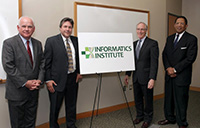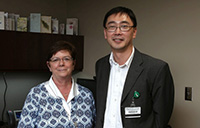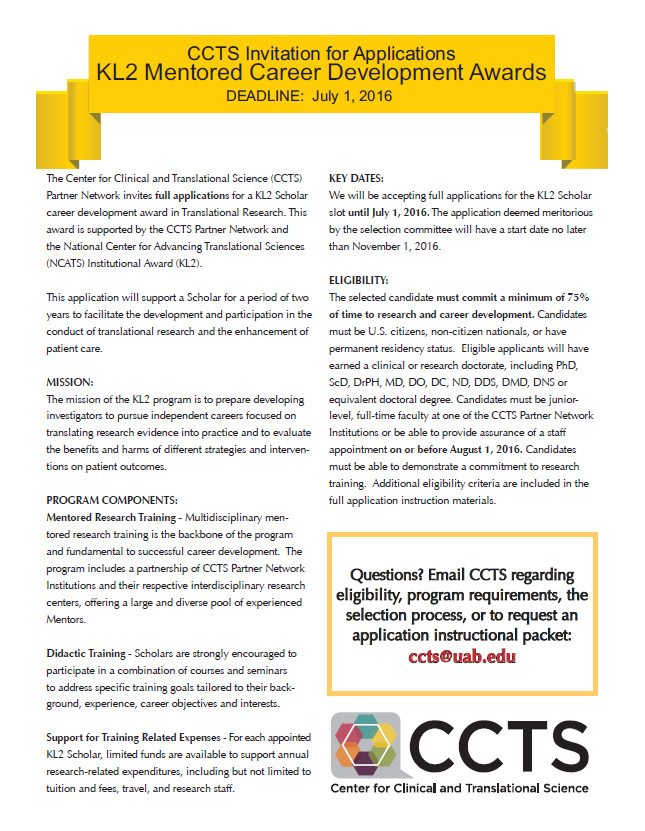On the first Wednesday of every month, CCTS now offers three consultation clinics: (1) Biostatistics, Epidemiology, and Research Design (BERD); (2) Bionutrition; and (3) Biorepository. All take place at PCAMS from 11:30am-1pm. No appointment necessary, but do bring your laptop and statistical, methodological, diet study, or specimen questions!
The BERD clinic offers assistance with research projects that are ongoing or planned, manuscripts in progress, and responses to peer reviewers. One-on-one consultations are also available by appointment for situations that may require more in-depth assistance, such as collaborating on pilot proposals and feasibility studies. The CCTS team of BERD experts includes Dr. David Redden, chair of the UAB Department of Biostatistics. A wealth of BERD resources is available on the CCTS website.
Betty Darnell heads the CCTS Bionutrition Unit, which offers a clinic to help researchers plan and design the nutritional components of their protocols, as well as to provide assistance with recruitment and screening of research participants and dietary data collection and analysis. Bionutrition also offers appointments if researchers are unable to attend the clinic or need greater assistance. A full list of the services available at the Bionutrition Clinic can be found here.
The Biorepository Clinic offers biobanking/biorepository consultations to better understand investigator needs. The clinic is staffed by Dr. Jeffrey C. Edberg and Felicia Hataway, who can discuss additional services such as specimen intake, cataloging, storing, and retrieval, access to fresh blood and banked specimens from healthy individuals, and other bedside to bench specimen needs. Visit the Biorepository page on the CCTS website to learn more or to reach the Biorepository team.
(download / view PDF flyer here)
In his opening remarks, Dr. Watts observed the growing importance of information science in an era of ever-bigger databases as an impetus for the vision of an informatics institute at UAB. He also pointed to work in informatics being done across the campus and the need for informatics to support world-class 21st century research as additional rationales for establishing the institute. Dean Vickers agreed and added how excited he was to see the day arrive in which the Informatics Institute team could finally move in to its new space. Both noted the many hours it had taken to achieve this, including the recruitment of II Director Dr. Cimino in March 2015 and Associate Director Dr. Jake Chen in April 2016.
In his comments to the gathering, Dr. Cimino said the new location will help with recruitment as well as collaboration with other informatics groups at the UAB campus and within the broader CCTS partner network. He summarized the Institute’s goals as “nothing less than world-class informatics research that will lead to development of an E.H.R. with vastly improved usability for both clinicians and researchers, and training and educational programs that will produce next-generation informaticians.” The Institute’s new website is now live at www.informatics.uab.edu, and you can follow the Institute on Twitter @InformaticsUab
 (L to R) UAB President Dr. Ray Watts, UAB Informatics Institute Director Dr. James Cimino, CCTS Director Dr. Robert Kimberly, and UAB School of Medicine Dean Dr. Selwyn Vickers. |
 Dr. Jacqueline Moss, UAB School of Nursing professor and assistant dean, Clinical Simulation and Technology,and UAB Informatics Institute Associate Director Dr. Jake Y. Chen. |
 The new Informatics Institute features a conference room inside of the former Regions bank vault. |
 We are inviting full applications for a KL2 Scholar career development award in translational research. The goal is to develop an investigator who can translate research evidence into practice and evaluate the benefits and harms of different strategies and interventions on patient outcomes.
We are inviting full applications for a KL2 Scholar career development award in translational research. The goal is to develop an investigator who can translate research evidence into practice and evaluate the benefits and harms of different strategies and interventions on patient outcomes.
The selected candidate must commit a minimum of 75% of time to research and career development. Past scholars have used the award to study diffusion tension imaging to diagnose Parkinson’s disease, decision-making capacity in patients with metastatic brain cancer, infection risk in children with juvenile idiopathic arthritis, and variations in cardiovascular risk among young adults presenting with metabolic syndrome. Applications due July 15, 2016.

